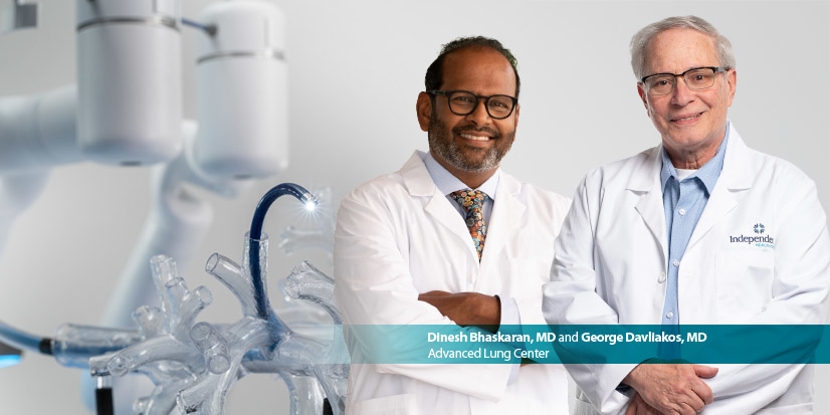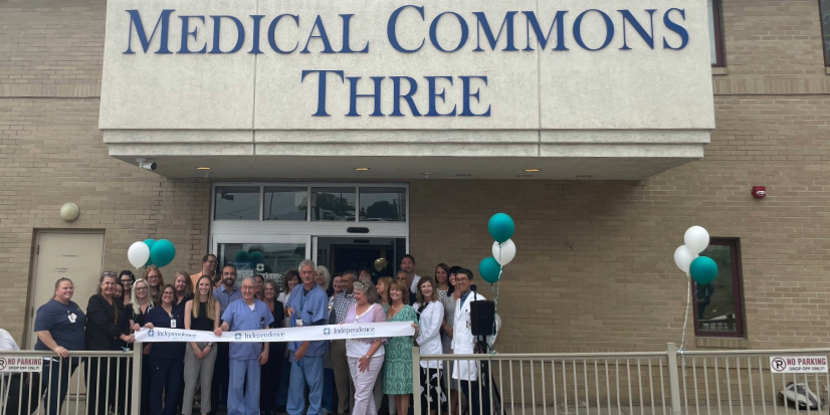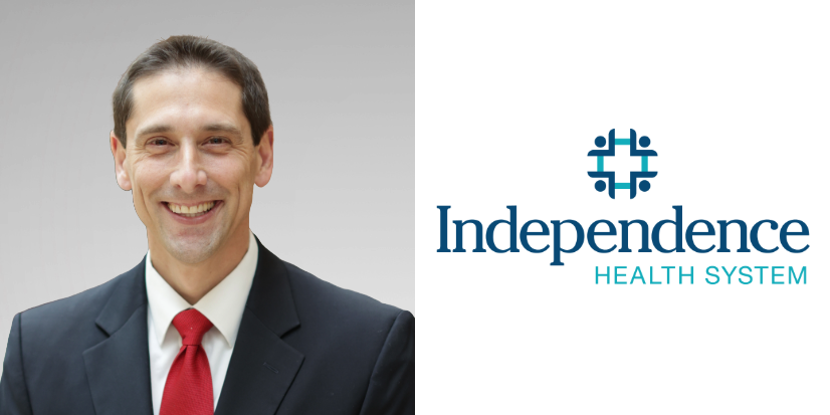Independence Health System Takes Lead in Alzheimer's Care, Offering Breakthrough Diagnosis and Treatment Infused with Hope
- Category: Media Release, Neurology
- Posted On:

GREENSBURG, PA, August 7, 2024 … For the first time in 20 years, new medications are available, not just to manage symptoms of Alzheimer’s disease, but to address the underlying cause. Independence Health System is leading the way in diagnosis and treatment and offering renewed hope to patients experiencing cognitive impairment, as the first in the region to provide these new therapies.
Mary Elizabeth Kovacik Eicher, MD, MPH, Director of Neurosciences for the health system, is overseeing the rollout of a robust program that rapidly moves patients from clinical assessment to infusion if appropriate when Alzheimer’s disease is detected. The protocol includes cerebrospinal fluid (CSF) analysis or amyloid positron emission tomography (PET) scan to determine the presence of disease-causing proteins and discussion with patients and their families about which of the medications recently approved by the Food and Drug Administration (FDA) would be most appropriate. Lecanemab (Leqembi) was approved in 2023, followed by Donanemab-azbt (Kisunla) in mid-July. In both cases, the drug attacks the amyloid plaque that is believed to be responsible for a toxic buildup causing damage to brain cells.
Independence neurologists began offering infusions in December. To date, 30-plus patients have begun immunotherapy infusions or are pending workups either in Greensburg or Butler.
Christine Lieb, 57, of Scottdale will have her sixth infusion of lecanemab on August 12 in Greensburg. She came to Independence Health System Neurology in November 2023 looking for a reason she couldn’t perform dog grooming skills that were previously familiar routines in her business. Diagnosed with early onset Alzheimer’s, Lieb has embraced the treatment regimen, noting that the clouds of confusion lift as soon as she receives the infusion. “I can tell when it’s time for another dose, and I know immediately that it is working,” she shared. Although there is no known family history of dementia, Lieb is not alone in this journey – her older sister also has Alzheimer’s disease and is receiving infusions in the community where she lives. Given their decade-plus age difference and stage of illness, it is likely Lieb will realize a greater benefit from the treatment for a longer period of time.
Deborah Provenzano, 66, has spent most of her adult life preparing for the inevitable. The Penn Township woman cared for her mother whose life was defined by Alzheimer’s disease that deteriorated over 15 years and ended in a nursing home. Two years ago, Debbie’s spouse, Pete, 74, began noticing subtle changes in his wife’s behavior: repeated questions about the day’s routine, missed ingredients in a favorite, familiar recipe, the inability to execute family gatherings without help. “I think I took her diagnosis harder that she did, given what she had already dealt with,” admitted Pete, with a catch in his voice. A patient of Independence Health System Neurology since June 2022, Debbie Provenzano will have her 19th infusion of lecanemab this month, augmented by her initial oral Alzheimer’s medications and supplements. Her cognitive improvement becomes more pronounced after each dose of medication with Debbie able to recall the busy babysitting schedule or upcoming gatherings of the couple’s four children, their spouses and 10 grandchildren who celebrate these small but significant changes each time they gather for a potluck meal.
A family of strong faith, the Provenzanos now live with hope and optimism, believing their offspring will benefit from the continued research and medical advancements that may lead to a cure.
“As with every therapy, there are risks and benefits,” explained Dr. Kovacik Eicher. “But we know the trajectory of Alzheimer’s if left untreated. My goal is always to empower my patients not to be defined by their illness. Now we have hope to offer where there was no hope before.”
Patients wishing to be evaluated by Independence Health System Neurology may contact the system’s Memory Clinics in Greensburg by calling 724-261-5619 and Butler at 724-431-1613, option 2.
Alzheimer’s disease is an irreversible, progressive brain disorder affecting nearly 7 million Americans that slowly destroys memory and thinking skills and, eventually, the ability to carry out simple tasks. While the specific causes of Alzheimer’s are not fully known, it is characterized by changes in the brain — including amyloid beta plaques and neurofibrillary, or tau, tangles — that result in loss of neurons and their connections. These changes affect a person’s ability to remember, think and speak.
In its earliest stages, Alzheimer’s is not dissimilar to lapses that might be considered a normal part of aging. A clinical evaluation can rule out dementia, or pinpoint the specific type. In nearly 70 percent of all dementia cases, Alzheimer’s is the cause, but until now, the only way to know for certain was after a person’s death, when an autopsy could confirm by assessing the changes that had occurred in the brain matter.
“Admittedly, neither of these drugs will cure Alzheimer’s, but we have waited so long for there to be a breakthrough to give people back the gift of time to be themselves.” said Dr. Kovacik Eicher. “Until now, all physicians could do was prescribe either Donepezil (Aricept) or Memantine (Namenda) when they suspected Alzheimer’s and hope the progression of disease slowed, so the medication did some good. Now we have a definitive way to know if the patient has Alzheimer’s and attack the cause.”
Both of the new medications are delivered over a series of up to one-hour infusions, with periodic MRI’s to assess for side effects. In 2025, Independence Health System plans to add Beta-amyloid PET scans as another assessment tool. Blood tests for tau protein, an indicator of underlying amyloid, are also on the horizon and appear to increase accuracy of Alzheimer’s diagnosis. Independence Health System is dedicated to providing its patients with the most up-to-date treatments for Alzheimer’s disease, evolving as medicine does.
About Independence Health System
Nationally recognized for quality care, Independence Health System comprise Butler Memorial, Clarion, Frick, Latrobe and Westmoreland Hospitals with a combined bed count of 925. With more than 1,000 physicians and advanced practice providers and 7,300 employees, the System is now the third largest in western Pennsylvania serving a population base of 750,000 in a footprint spanning more than 10 counties.
The System includes tertiary programs that are rated among America’s best for cardiac care and surgery by Healthgrades in its Top 100 and Top 50 designations, and one of only five in Pennsylvania to achieve a five-star rating in cardiac surgery. In similar fashion, the prestigious Society of Thoracic Surgeons (STS) bestowed its top three-star rating. Historically, less than 10 percent of programs within the STS data base achieve this elite standing. The hospitals of Independence Health System also have earned a host of accolades from such prestigious outlets and sources as US News and World Report, Newsweek Magazine, the American College of Radiology, the American College of Cardiology, the American College of Surgeons, the Joint Commission, Leapfrog and the American Heart/Stroke Association.
Locally owned and locally controlled, Independence Health System offers its patients low-cost, high-quality care across the care spectrum in such specialties as cardiology, cardiovascular and thoracic surgery, orthopedics and sports medicine, minimally invasive and robotic surgery, women’s health and obstetrics, emergency medicine, behavioral health and primary care. Its network of outpatient centers sees more than 1.2 million visits annually. The homecare division further supports patients at all stages of life with home health and hospice services.
Independence Health System continues to change the healthcare landscape in western Pennsylvania by meeting patient needs through superb physician expertise, outstanding nursing, the latest in technology and programmatic depth.



